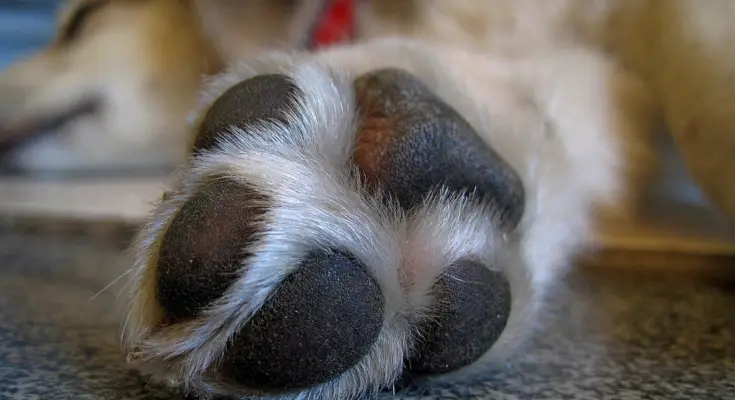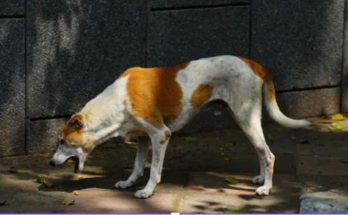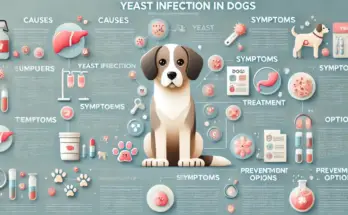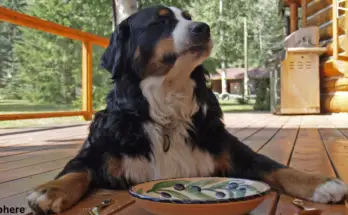Dogs licking their itchy paws too much can be frustrating for pet owners. While it’s normal for dogs to lick their paws occasionally, constant licking of itchy paws might signal an issue that needs attention.
Luckily, natural home remedies can gently ease your dog’s discomfort. This guide will share simple yet effective ways to stop dogs from licking their itchy paws.
Why Do Dogs Lick Their Itchy Paws?
Dogs often lick their paws as part of regular grooming, even if they don’t groom themselves much overall. If your dog only licks their paws occasionally, it’s usually nothing to worry about.
However, frequent or intense paw licking isn’t normal and may point to an itchy paws issue that needs attention. If your dog is licking their paws excessively, start by checking for any signs of irritation, pain, or injury. Dogs tend to lick their itchy paws when they’re itchy, sore, or uncomfortable, much like they would lick a wound.
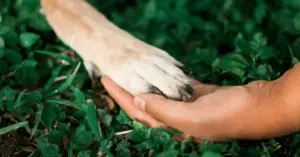
Allergies and Irritants in Dogs
Depending on your location, your dog may encounter various allergens like pollen, mites, and spores that can cause environmental allergies. Since a dog’s paws are always in contact with surfaces where these allergens settle, itchy paws are a common sign of environmental sensitivities. Food allergies can also trigger itchy paws in your dog’s skin and paws.
In winter, hazards like salt and de-icing chemicals can irritate sensitive paws, leading to excessive licking of itchy paws as dogs try to clean the discomfort. During hot summer days, walking on heated pavement can burn your dog’s paw pads, causing pain and even a bacterial infection if left untreated. Additionally, some household cleaning products can irritate your dog’s itchy paws, so it’s worth considering if you’ve recently used a new product on your floors or laundry.
Injuries and Itchy Paws
Sudden paw licking in dogs could be a sign of an injury or a foreign object causing discomfort. Your dog might have stepped on something sharp, walked on hot pavement, or come into contact with ice melt. They could also have been bitten or stung by an insect or another animal.
Sometimes, substances or objects like splinters or grass awns can get stuck in their paws, irritating their itchy paws. If your dog is licking their itchy paws excessively, it’s a good idea to check for any signs of injury or something lodged between their paw pads.
Yeast Infections and Itchy Paws
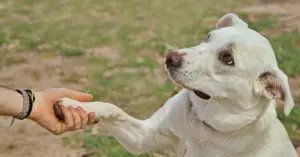
Yeast dermatitis is a common fungal infection that often develops in warm, moist areas, such as between a dog’s paw pads. It occurs when the skin overproduces yeast cells, leading to intense itchiness and irritation of their itchy paws. Excessive licking can worsen the condition, potentially causing a secondary bacterial infection that makes the skin even more inflamed. This cycle often requires antifungal medication to break.
A telltale sign of a yeast infection in itchy paws is a strong, rancid odor, often described as smelling rotten. Certain breeds, like Bulldogs and Pugs, are more prone to these infections due to their skin folds. Yeast infections can also indicate an underlying immune system issue, so it’s essential to address the root cause. If you suspect a yeast infection, consult your vet for a proper diagnosis and treatment plan.
Anxiety and Itchy Paws
Licking is a way for dogs to self-soothe, so an anxious or nervous dog may lick their itchy paws excessively to relieve stress. Other signs of anxiety can include compulsive behaviors such as pacing, excessive panting or drooling, avoiding interaction, and unusual vocalizations. Separation anxiety, in particular, can lead to self-destructive behaviors like obsessive paw-licking of itchy paws. If you suspect your dog is experiencing anxiety, it’s a good idea to consult a behaviorist for guidance and support.
Growths on Dog Paws and Itchy Paws
If your dog is limping, it could be due to an abnormal growth on one of their paws, like a cyst or tumor. Another possibility is arthritis or an injury to the soft tissue or bones, which may not be visible.
If your dog is favoring one paw over the others, it’s often a sign of a paw injury, foreign object, or growth. Keep an eye out for limping, as it could indicate these issues. However, these conditions can sometimes affect multiple paws at once and cause itchy paws.
Dry Skin and Related Conditions Affecting Itchy Paws
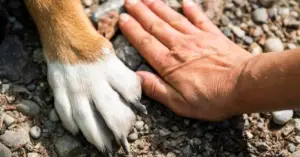
During winter, the lower humidity indoors and outdoors can lead to dry skin for both dogs and humans. Dogs with dry paw pads may lick them to soothe the itching of their itchy paws.
Paw pad hyperkeratosis is a common condition in dogs that causes thickened skin on their paws, typically appearing in their early years. The excess keratin makes the paw pads extremely thick and dry, sometimes causing pain even during walking and triggering itchy paws.
Behavioral Concerns and Itchy Paws
If there are no underlying health issues causing paw problems, your dog’s paw licking could be due to behavioral factors, though this is less common. It might simply be a sign of boredom or, in some cases, stress, fear, or anxiety.
Sometimes, licking begins out of boredom and turns into a habit that becomes soothing for your dog. In more severe situations, dogs may develop compulsive behaviors, causing them to obsessively lick their itchy paws.
Pain and Arthritis in Dogs with Itchy Paws
Dogs have an instinct to lick and clean their wounds, even when there isn’t an actual wound. If your dog has painful paws, they may lick them to try to ease the discomfort. If you also notice signs like stiffness, reluctance to play, weight loss, or a general change in mood, it’s important to visit the vet to identify the root cause of the itchy paws.
Simple Home Remedies for Itchy Paws in Dogs
Medicated Shampoos and Topical Treatments for Dogs
If your dog is licking their paws due to allergies or bacterial infections, topical treatments like sprays or creams with hydrocortisone, or medicated dog shampoos such as Pet Honesty’s Chlorhexidine in the U.S. or Malaseb in Australia, can help restore a healthy balance of microorganisms on your dog’s skin. However, allergies can be challenging to diagnose and treat, so it’s a good idea to consult with your vet to pinpoint the cause and develop the best treatment plan for your dog’s itchy paws.
Adjusting Your Dog’s Diet for Itchy Paws

Excessive paw licking can sometimes be linked to an overproduction of yeast in your dog’s body. One common cause of yeast infections is food-related allergies. If this is the case, it may be time to reassess your dog’s diet and consult with your vet to determine the best solution, such as switching to a raw food diet or an allergenic kibble for your dog’s itchy paws.
TIP: If your dog suffers from food allergies causing itchy paws, we highly recommend Royal Canin Anallergenic Dry Food. Our cocker spaniel, Ziggy, had frequent yeast infections for years, but switching to this diet helped resolve his itchy paws. Always consult with your vet before making any changes to your dog’s diet.
Bathing and Paw Balms for Itchy Paws
If your dog’s paws are dry and cracked, giving them a daily bath can help soothe and soften their skin. Opt for a high-quality pet-formulated dog shampoo or a gentle baby shampoo to help with their itchy paws. After the bath, make sure to dry their paws thoroughly, paying special attention to the areas between the toes to prevent cracking and infection.
Once your pup is dry, apply a soothing natural paw balm to lock in moisture and keep and let them wear it for a few days, you may find that your dog will stop licking their itchy paws. For some dogs, bandaging their paw is enough to prevent them from licking their itchy paws – out of sight, out of mind after all!
Natural Home Remedies for Itchy Paws in Dogs

If you prefer to try a natural home remedy to relieve the itch and irritation causing your dog’s itchy paws, the following all-natural solutions can be effective, depending on the underlying cause of their constant licking.
Oatmeal Bath for Itchy Paws
An oatmeal bath can provide quick relief for an itchy dog. With its soothing and anti-inflammatory properties, oatmeal is an effective natural remedy for calming your pup’s itchy paws. To make the bath, simply grind plain oatmeal into a fine powder, add it to a warm bath, and let your dog soak for 15-20 minutes. This soothing soak will help calm irritated skin and alleviate your dog’s itching, stopping the licking of itchy paws.
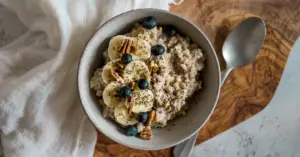
Chamomile Tea for Itchy Paws
Chamomile is widely recognized for its soothing anti-inflammatory properties, making it an effective natural remedy for relieving your dog’s itchy paws. Its antimicrobial qualities also help prevent infections that can arise from excessive scratching. Chamomile tea can be used in several ways to alleviate the itch causing your dog to lick their itchy paws—whether as a chilled tea compress, a bath soak, or a spray.
Apple Cider Vinegar for Itchy Paws
“Can I put vinegar on my dog’s paw to stop their licking?” is a common question among pet parents. The answer is yes, diluted apple cider vinegar can be an effective home remedy to stop your dog from licking their itchy paws. Just be sure to avoid applying it to any broken skin, as it may sting and cause discomfort. Also, keep it away from your dog’s ears, eyes, or genital area. For a gentle application, mix equal parts apple cider vinegar and water in a spray bottle, then lightly mist your dog’s itchy paws.
Coconut Oil for Itchy Paws

Coconut oil isn’t just a trendy ingredient for humans—it’s also an excellent solution for dogs! With its moisturizing and soothing properties, applying coconut oil to your dog’s paws can help relieve dryness and itching, ultimately stopping the constant licking of itchy paws.
It also helps maintain a shiny, healthy coat. Be sure to use virgin, unrefined coconut oil, and start with a small amount to see how your dog’s skin reacts. You can also incorporate coconut oil into your dog’s diet with these homemade dog treats to help with itchy paws.
Baking Soda for Itchy Paws
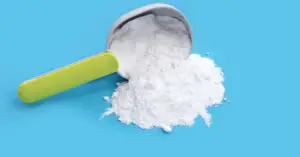
Yes, baking soda is more than just a kitchen staple—it’s a natural anti-inflammatory and acid neutralizer that can help soothe your dog’s irritated paws and skin. To use, mix 1/2 cup (120 ml) of baking soda into a bucket of warm water and let your dog soak their paws for 10 minutes. For the best results, repeat this process 2 to 3 times daily. To keep your dog entertained during the soak, offer some dog treats. If your dog is larger or more energetic, you can soak their paws in a bathtub and double the baking soda mixture if needed.
Table of Contents
ToggleConclusion
Keeping your dog’s feet and skin healthy is the best way to prevent excessive paw licking. Regularly trim their nails and bathe them as needed. Be sure to inspect their paws frequently, especially after outdoor activities.
Avoid walking your dog in extreme weather conditions. You may also want to try protective products like dog boots or paw balms to shield your paws from harsh environments.
Remember to schedule routine wellness check-ups with your vet. If you notice any signs of paw licking between visits, be sure to reach out to your vet for advice.
FAQ
Should I take my dog to the vet for paw licking?
While it’s normal for dogs to lick their paws occasionally as part of self-grooming, frequent or aggressive licking may indicate a health or behavioral issue. A vet can help assess if your dog has an injury, allergy, or infection that requires treatment. If health concerns are ruled out, the vet can also offer advice on managing any behavioral problems.
Is coconut oil safe to apply to a dog’s paws?
Coconut oil is safe to use on your dog’s paws. It can help moisturize and soothe dry, cracked, or irritated skin. Additionally, its antibacterial, antiviral, and antifungal properties can aid in healing wounds and relieving itchiness from fungal, bacterial, or yeast infections. However, coconut oil should not be relied upon as the sole treatment for infections—consult your vet for proper care.
Why do dogs lick their paws at night?
Dogs may lick their paws at night as a way of self-soothing to relieve anxiety or tension, helping them relax and fall asleep. It can also be a response to pain, itchiness, or discomfort caused by arthritis, injury, allergies, or infection.

